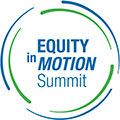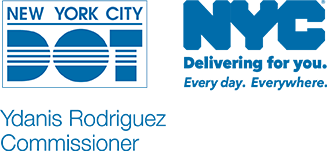Time: 2:15pm to 3:30pm
Location: Concourse Level – Conference Rooms
Planning With, Not For, Communities
Effective community engagement is an ongoing practice, not just a project milestone. This session will explore how to shift from transactional to relational engagement, embedding equity throughout the planning process. Through case studies and a rich discussion, participants will examine different approaches to engagement, the impact of issue framing, and strategies for fostering long-term collaboration with communities. Join us for a dynamic conversation on rethinking engagement as a shared process that leads to more inclusive and equitable outcomes.
Location: Concourse Level – Queens (C198)
Speakers:
- Anthony Perez, Bronx Borough Commissioner, NYC Department of Transportation
- Cinthia De La Rosa, Urbanist and Consultant, Co:Census
- Daisy González, Deputy Director of Public Realm Programming, NYC Department of Transportation
- Liza Ehrlich, Chief Operating Officer, The Horticultural Society of New York
- Nella Gonçalves, Executive Director, One Treasure Island
- Suany Chough, Assistant Deputy Director for Planning, San Francisco County Transportation Authority
Empowering Communities: Expanding E-Bike Access
In recent years, cities nationwide have invested in initiatives that empower low-income communities by expanding access to e-bikes and other forms of micromobility. This panel brings together experts from state agencies, municipalities, and non-profits to discuss strategies for increasing e-bike ownership through targeted financial incentives, programs, and research. Topics will include various incentive models, creative funding approaches, and the role of community partnerships. Panelists will share real-world examples and lessons learned on addressing challenges such as structural barriers, budget constraints, and evolving regulations—offering practical guidance for designing equitable, scalable e-bike programs.
Location: Concourse Level – Staten Island (C201-202)
Moderator: Irene Figueroa-Ortiz, Senior Policy Advisor, NYC Department of Transportation
Speaker:
- Melinda Hanson, Founder, Brightside
- Nina Haiman, Program Manager, Clean Transportation, New York State Energy Research and Development Authority
- Sue Baldwin, Electrified Mobility Program Manager, City and County of Denver
Equity Metrics: Measuring Success, Impact, and Outcomes
Designing transportation projects, programs, and services that achieve more equitable outcomes requires the use of key metrics to understand project outcomes and community impact. Setting metrics before implementation is crucial in determining what success looks like, including clear, measurable indicators. The successful identification of these metrics depends on having real conversations with key partners and community members to explore their goals and determine realistic project outcomes that support those goals. Through a series of discussions, speakers will share real-world examples of best practices, challenges they've overcome, and lessons learned in their efforts to design and plan transportation projects, programs, and services more equitably to improve mobility and the lives of people.
Location: Concourse Level – The Bronx (C204-205)
Moderator: KeAndra Cylear Dodds, Executive Officer, Equity and Race, LA Metro
Speaker:

